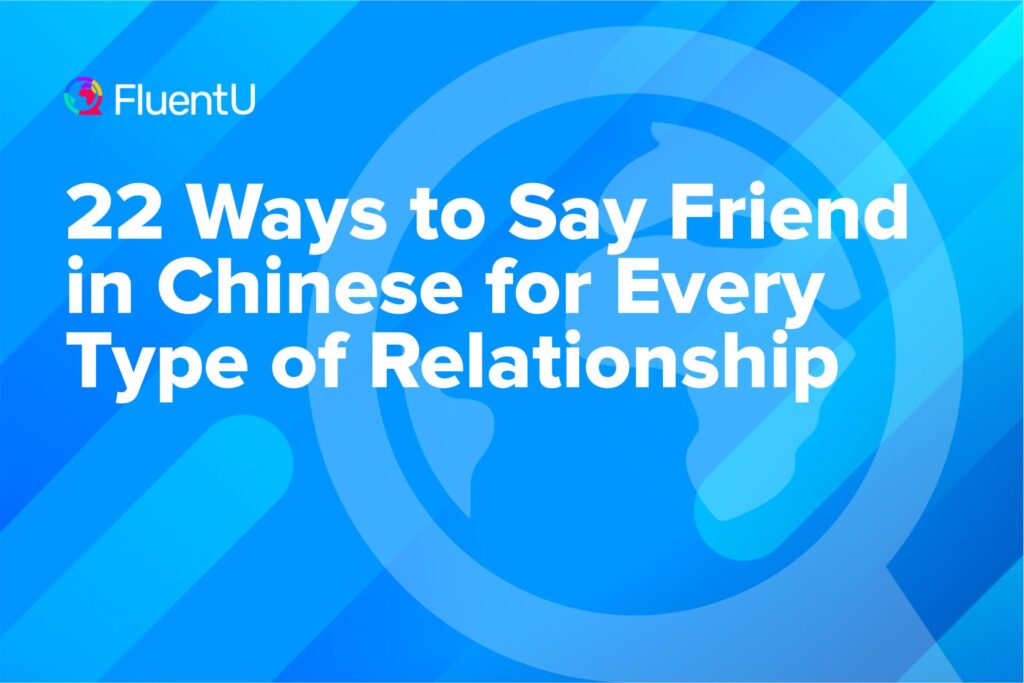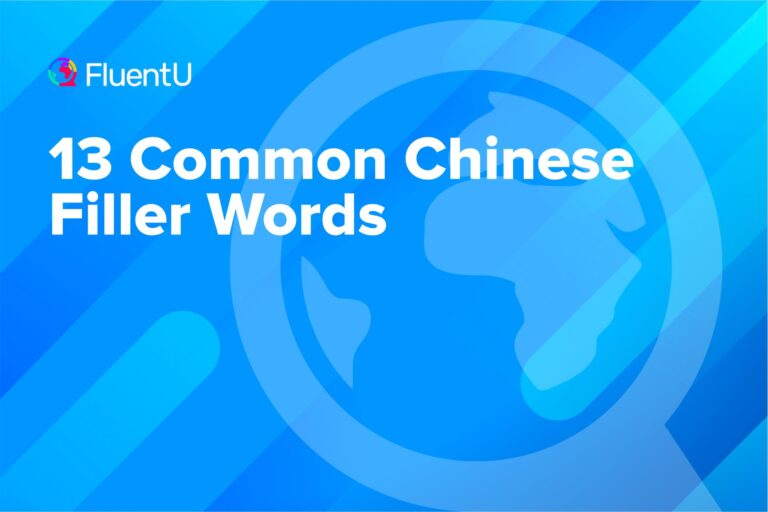Contents
- 朋友 (péng you): The Most Common Way to Say “Friend”
- Other Ways to Say “Friend” in Chinese
- 知己 (zhī jǐ) — Intimate friend
- 好朋友 (hǎo péng you) — Good friend
- 亲友 (qīn yǒu) — Dear friend
- 好友 (hǎo yǒu) — Good friend
- 亲近的人 (qīn jìn de rén) — Close Person
- 同志 (tóng zhì) — Comrade
- 老朋友 (lǎo péng you) — Old friend
- 老友 (lǎo yǒu) — Old friend/buddy
- 志同道合的人 (zhì tóng dào hé de rén) — Like-minded individuals
- 闺蜜 (guī mì) — Best friend (between females)
- 伙伴 (huǒ bàn) — Partner
- 同伴 (tóng bàn) — Companion
- 伴侣 (bàn lǚ) — Companion
- 同学 (tóng xué) — Schoolmate
- 同事 (tóng shì) — Colleague
- 哥们儿 (gē men er) — (Male) Buddy/pal (Beijing dialect)
- 女性朋友 (nǚ xìng péng you) — Female friend, and 男性朋友 (nánxìng péngyou) — Male friend
- 兄弟 (xiōng dì) — Brother, and 姐妹 (jiě mèi) — Sister
- 哥哥 (gē ge) — Bro, and 姐姐 (jiě jie) — Sis
- 女朋友 (nǚ péng you) — Girlfriend, and 男朋友 (nán péng you) — Boyfriend
- 女友 (nǚ yǒu) — Girlfriend, and 男友 (nán yǒu) — Boyfriend
- And One More Thing...
22 Ways to Say Friend in Chinese for Every Type of Relationship

Beginners in Chinese learn that 朋友 (péng you) is how you say “friend,” but just like in English, there are various ways to describe friendships in Mandarin.
Whether you’re referring to your bestie, colleague or anything in between, find out all the terms for “friend” in Chinese in this post.
Download: This blog post is available as a convenient and portable PDF that you can take anywhere. Click here to get a copy. (Download)
朋友 (péng you): The Most Common Way to Say “Friend”
This is the most common way to say “friend” in Mandarin Chinese. It can be used to refer to any kind of friend, from a casual acquaintance to a close confidante.
The word is composed of two characters: 朋 (péng) means “friend” or “companion,” and 友 (yǒu) means “friend” or “buddy.”
You can use 朋友 to address someone directly or to talk about friends in general. For example:
这是我的朋友。 (zhè shì wǒ de péng you) — This is my friend
朋友们一起出去吃饭。 (péng you men yì qǐ chū qù chī fàn) — The friends are going out to eat together.
As you can see above, the word 朋友 can also be used to refer to one friend or multiple friends.
You can quite easily get away with only knowing the word 朋友 for “friend” in Chinese. But for more nuanced relationships, there are plenty of other words for “friend” in Chinese. For the most effective way to learn new ways to refer to a friend, you may want to turn to a program that lets you see vocabulary words in context, like FluentU.
FluentU takes authentic videos—like music videos, movie trailers, news and inspiring talks—and turns them into personalized language learning lessons.
You can try FluentU for free for 2 weeks. Check out the website or download the iOS app or Android app.
P.S. Click here to take advantage of our current sale! (Expires at the end of this month.)
Other Ways to Say “Friend” in Chinese
知己 (zhī jǐ) — Intimate friend
Is someone more than just a friend to you? Use this word to refer to your bosom friend who understands you deeply. This term carries a profound sense of understanding.
You would typically reserve 知己 for those few individuals who truly know you well and with whom you have a strong emotional connection.
好朋友 (hǎo péng you) — Good friend
This is a general term for a friend who is close and trustworthy, but may not necessarily be as intimately connected as a 知己. You can use 好朋友 to refer to friends with whom you have a strong and positive relationship. These are the friends you enjoy spending time with, sharing experiences, and supporting each other.
亲友 (qīn yǒu) — Dear friend
This word combines 亲 (qīn) meaning “close” or “dear” with 友 (yǒu) meaning “friend.” 亲友 is often used to describe friends who aren’t just casual acquaintances but have a deeper and more meaningful connection. These are the friends you might turn to for support in times of need!
好友 (hǎo yǒu) — Good friend
好友 also means “good friend” but is a more casual term compared to the previous two. It can encompass a broader range of friendships, including both close and less close friends. You can use it to refer to friends with whom you have a good relationship, whether they’re very close or more casual friends.
亲近的人 (qīn jìn de rén) — Close Person
This is another term used to refer to family members or friends with whom you share a deep emotional bond and intimacy. It often refers to those individuals who know you well, with whom you share your thoughts and feelings and who are an integral part of your life.
同志 (tóng zhì) — Comrade
Originally used to refer to comrades in a political or revolutionary context, this term has also been used to describe individuals who share a common goal, ideology or cause. It can carry connotations of unity and solidarity, often used within socialist or communist movements.
In recent years, the term has also been used to refer to individuals in the LGBTQ+ community, particularly in Mainland China, where it has taken on a more colloquial meaning related to sexual orientation and gender identity.
老朋友 (lǎo péng you) — Old friend
老朋友 literally translates to “old friend.” It’s used to refer to someone with whom you’ve had a long-standing relationship or friendship. It’s often used to describe friends you’ve known for a significant period of time, regardless of the level of closeness.
老友 (lǎo yǒu) — Old friend/buddy
老友 also translates to “old friend,” but it carries a more informal and colloquial tone. This term can be seen as a bit nostalgic and is often used in a casual or friendly context, similar to how you might refer to an old buddy or pal in English.
志同道合的人 (zhì tóng dào hé de rén) — Like-minded individuals
People who share the same aspirations and values are often referred to as 志同道合的人. This term refers to people who share similar goals, values, beliefs or interests.
In essence, the term emphasizes the idea that these individuals not only have common interests but also share a deep sense of alignment in their values and goals, which brings them together in a meaningful way. It’s used to highlight the unity and camaraderie among like-minded individuals.
闺蜜
(guī mì) — Best friend (between females)
This is a Chinese term that emphasizes the close and intimate relationship between two female friends. The characters 闺 (guī) and 蜜 (mì) respectively mean “room” and “close.” Together, they convey the idea of a friend who’s as close as if they’re sharing the same room or secrets.
伙伴 (huǒ bàn) — Partner
This term encompasses the idea of a companion or collaborator with whom you engage in shared activities, projects or journeys. It can refer to various types of partnerships, including work partners, study partners and travel companions. This is the term you’d use for your buddy who’s always down for an impromptu road trip or your tennis doubles partner.
同伴 (tóng bàn) — Companion
同伴 also means “companion” or “mate,” but it emphasizes the idea of someone who accompanies you or shares an experience with you. It implies that you’re going through something together. The term can be used to describe travel companions, friends who engage in hobbies together or partners in various endeavors.
伴侣 (bàn lǚ) — Companion
This word refers to a companion or partner in a broader sense and can be used to describe everything from spouses to a beloved pet to a business partner. It implies a deep and committed relationship.
同学 (tóng xué) — Schoolmate
This refers to a person who has attended the same school as you, either simultaneously or at some point in the past. It’s used in basically the same way that you’d use “schoolmate” in English.
同事 (tóng shì) — Colleague
Use this for a person who works alongside you in the same workplace. 同事 emphasizes work-related relationships rather than personal connections, and it’s a neutral term used to address and refer to people within a professional context. Whether they’re close collaborators or people you have limited interaction with, they can all be referred to as 同事.
哥们儿 (gē men er) — (Male) Buddy/pal (Beijing dialect)
哥们儿 is a colloquial term used in the Beijing dialect. It’s an informal and friendly way to refer to a male friend, and it carries a sense of camaraderie and closeness. This term is often used between close buddies to address each other in a casual and affectionate manner. It’s similar to saying “buddy” or “pal” in English and reflects a comfortable and informal relationship between friends.
女性朋友 (nǚ xìng péng you) — Female friend, and 男性朋友 (nánxìng péngyou) — Male friend
To specify a male friend, you can use 男性朋友 (nán xìng péng you), where 男性 (nán xìng) means male. For a female friend, you use 女性朋友 (nǚ xìng péng you), with 女性 (nǚ xìng) meaning “female.”
These terms explicitly indicate the gender of the friend without implying a romantic relationship.
兄弟 (xiōng dì) — Brother, and 姐妹 (jiě mèi) — Sister
When you call a friend a brother or sister, you’re highlighting the emotional connection and intimacy that you share. It implies that you consider your friend to be like family and that you have a strong sense of loyalty and care for them.
哥哥 (gē ge) — Bro, and 姐姐 (jiě jie) — Sis
Shorten “brother” and “sister” to get these more casual words. You’re probably familiar with their use in English, where they’re used in basically the same way.
女朋友 (nǚ péng you) — Girlfriend, and 男朋友 (nán péng you) — Boyfriend
女朋友 is used to refer to a female romantic partner while 男朋友 is the Chinese word for “boyfriend.” Both are used to refer to romantic partners.
女友 (nǚ yǒu) — Girlfriend, and 男友 (nán yǒu) — Boyfriend
You may hear young people use these abbreviations. These terms are informal but increasingly common, especially in online and social media contexts.
Practice using the different ways to say “friend” in Chinese with your Chinese-speaking friends!
And One More Thing...
If you want to continue learning Chinese with interactive and authentic Chinese content, then you'll love FluentU.
FluentU naturally eases you into learning Chinese language. Native Chinese content comes within reach, and you'll learn Chinese as it's spoken in real life.
FluentU has a wide range of contemporary videos—like dramas, TV shows, commercials and music videos.
FluentU brings these native Chinese videos within reach via interactive captions. You can tap on any word to instantly look it up. All words have carefully written definitions and examples that will help you understand how a word is used. Tap to add words you'd like to review to a vocab list.
FluentU's Learn Mode turns every video into a language learning lesson. You can always swipe left or right to see more examples for the word you're learning.
The best part is that FluentU always keeps track of your vocabulary. It customizes quizzes to focus on areas that need attention and reminds you when it’s time to review what you’ve learned. You have a 100% personalized experience.
Start using the FluentU website on your computer or tablet or, better yet, download the FluentU app from the iTunes or Google Play store. Click here to take advantage of our current sale! (Expires at the end of this month.)











